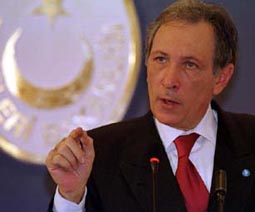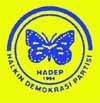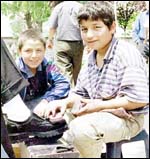5
March 2002
![]()
2. "Iraqi Kurdish leader urges democratic change in Iraq", a prominent Iraqi Kurdish leader on Tuesday called for a democratic change of regime in Iraq involving forces within the country instead of a military intervention from outside.
3. "Turkey prepares new limited amnesty for Kurdish rebels", Turkey is preparing a draft law to give limited amnesty for members of outlawed groups, especially the Kurdistan Workers Party (PKK), a government spokesman said Monday.
4. "Dam is an excuse", columnist Sami Kohen writes on the construction of new dams and why international consortiums are not supporting them.
5. "Prosecutor asks for acquittal of 29 suspects in HADEP's 'calendar' case", Prosecutor Talat Salk has asked for the acquittal of 29 suspects in the "calendar" case, filed against the pro-Kurdish People's Democracy Party (HADEP), which is also facing a closure case at the Constitutional Court. Salk also demanded the postponement of the case for 21 suspects and the separation of the file of one suspect.
6. "Seven Families Charged For Giving Their Children Kurdish Names", Turkey Claims Name Violations. Seven families have been charged with breaking Turkish law by giving their children traditional Kurdish names, officials said Monday.
1. - AFP - "Turkey's Cem warns of dangerous polarization over EU":
ANKARA / March 5 
Turkish Foreign Minister Ismail Cem urged an end to harsh debates
at home over whether Turkey should join the EU, warning that polarization
would damage the country's membership bid.
Cem, who was the chief campaigner for the declaration of Turkey's candidacy in 1999, said he saw his efforts thrown in danger, in a television interview, the text of which was published in the Radikal daily on Tuesday. "If we continue to quarrel like this, it will be really very unfortunate. There will be delays and many things will not be fulfilled," Cem said.
He was referring to a recent escalation in debates in the country on whether the EU was sincere in its relations with Turkey, the only candidate among the 13 hopefuls that has not yet started accession talks.
EU opponents claim the Union is using its political criteria as a leverage to weaken and even divide Turkey by strengthening the rights of the Kurdish minority. They argue Brussels will never admit Turkey, a mainly Muslim nation, into the bloc.
"Nobody sees us as an enemy and we cannot see anybody as an enemy... We must say 'stop' to these extreme arguments on imaginary issues," Cem said. The EU has recently urged Turkey to abolish the death penalty for all crimes, a move that would save Kurdish rebel leader Abdullah Ocalan from the gallows, and to grant the Kurds the right to education in their mother tongue. Many fear that expanding minority freedoms will fan separatist sentiment among the Kurds and rekindle a recently declined Kurdish rebellion for self-rule in southeast Turkey, which has claimed some 36,500 lives.
Far-right Deputy Prime Minister Devlet Bahceli said Tuesday: "Undertakings that will be seen as successful steps towards EU membership today, may lead to consequences that will irreversibly damage Turkey's security and internal structure tomorrow."
In a speech in parliament, Bahceli also described the EU as "deprived of diplomatic vision and common sense" as he lashed out at a resolution passed last week by the European Parliament, which urged Ankara to recognize as genocide the killings of Armenians under the Ottoman Empire.
On Saturday, Bahceli accused the EU of "planting mines" on Turkey's road to membership. Bahceli's Nationalist Movement Party, the senior partner of Prime Minister Bulent Ecevit's three-way coalition, has frequently impeded reforms to improve Turkey's crippled democracy.
Cem said the debates over the EU had gone out of proportion and warned that ties between Ankara and Brussels would suffer. "The rhetorics in Turkey are becoming sharper. It is unthinkable that this will not annoy the EU," he said. The debates flared particularly after the small left-wing Labor Party (IP) disclosed confidential e-mails written by the EU envoy here to EU officials and Turkish recipients, without explaining how it got hold of the messages. Even though the messages did not contain any bombshells, the IP accused the envoy of working against Turkish interests and demanded she be declared persona non-grata.
Some observers said the affair was plotted by EU opponents
within the state to tarnish Turkey-EU ties at a time when Ankara is
struggling to accomplish reforms to align it with the Union's norms.
![]()
2. - AFP - "Iraqi Kurdish leader urges democratic change in Iraq":
ANKARA / March 5 / by Hande Culpan
A prominent Iraqi Kurdish leader on Tuesday called for a democratic
change of regime in Iraq involving forces within the country instead
of a military intervention from outside.
"We are for fundamental democratic change in Iraq with Iraqi democratic and progressive forces," Jalal Talabani, who heads the Patriotic Union of Kurdistan (PUK), told reporters after talks with Turkish foreign ministry officials here. "If these Iraqi democratic forces will be supported from the outside, it is welcome," the PUK leader added, but underlined that his faction was against "foreign interference in Iraq".
Talabani's remarks came at a time of heightened fears that Baghdad could be the next target of the US-led anti-terror drive for its resistance to allow UN weapons inspectors to return. Asked about a possible military strike against Iraq, the PUK leader said: "We prefer a democratic change in Iraq." The United States, Iraq's arch-enemy, has made it clear that it wants to get rid of Iraqi President Saddam Hussein and has tried to unite the Iraqi opposition for this purpose, with little success.
Talabani reiterated his concerns that overthrowing Saddam without a sound alternative to replace him was not a plan he favoured. "If I meet American friends, I will tell them that we want to know what is the future of Iraq. If the plan is to replace our old dictator with a new one, then we are not supporting it," he told reporters.
His views are also shared by another Iraqi Kurdish leader, Massoud Barzani of the Kurdistan Democratic Party (KDP), who, along with Talabani, has controled much of northern Iraq since it has been outside Baghdad's control following the 1991 Gulf war.
In an interview with Turkish television last month, Barzani said the most important question in the plan to oust Saddam was who would replace him and the uncertainty that the new ruler would be better than Saddam. Talabani also underlined his allegiance to Iraq's territorial integrity, trying to allay Turkish fears over an independent Kurdish state in northern Iraq.
"There is no desire or attempt for the division of Iraq," the PUK leader said. "We are for strengthening the unity of Iraq for protecting and defending Iraq's national unity and achieving a demcratic fundamental change in Iraq and having a democratic united Iraq," he added.
Turkey, a key Muslim ally of Washington in the war against terrorism, is opposed to a strike against Iraq, fearing that regional turmoil could result in the break-up of Iraq and subsequently in the establishment of a Kurdish state in northern Iraq.
Such a state could fan separatist sentiment in neighboring
southeast Turkey, where a 15-year Kurdish rebellion has just recently
subdued. Turkey has recently called on the Iraqi leader on several occasions
to allow UN weapons inspections to resume, but they have led to no change
in Baghdad's stance. ![]()
3. - AFP - "Turkey prepares new limited amnesty for Kurdish rebels":
ANKARA / March 4 
Turkey is preparing a draft law to give limited amnesty for members
of outlawed groups, especially the Kurdistan Workers Party (PKK), a
government spokesman said Monday.
"This law is on the cabinet's agenda. We are working on it," State Minister Tunca Toskay told reporters after a cabinet meeting. But he refused to elaborate further and said details, such as the scope of the law, would be determined at the end of ongoing evaluations. The last limited amnesty law targeting "terrorists" was passed by the Turkish parliament in summer 1999 and aimed principally to speed up the dissolution of the PKK following the capture of its leader Abdullah Ocalan in February of the same year.
The law, commonly known as the "repentance law," offered lesser penalties for members of outlawed groups who have surrendered, so long as they have not taken part in armed attacks against security forces and who supply information about their organisation. It specifically excluded senior members who had a say in the activities and running of the organizations.
According to the Turkish press, the new amnesty is expected to have a larger scope and include leading members of "terrorist" organizations but it is unlikely to benefit Ocalan, who is on death row on a Turkish prison island for treason.
More than 36,500 people have died in clashes between the PKK and government troops since 1984, when the rebels took up arms for self-rule in Turkey's southeast. Heavy fighting has significantly scaled down since September 1999 when the the PKK announced it was abandoning its armed campaign to seek a peaceful resolution to the conflict.
But the PKK truce was brushed aside by the powerful Turkish
army, which has called on the rebels either to turn themselves in or
face the military's wrath. ![]()
4. - Milliyet - "Dam is an excuse":
March 5
Columnist Sami Kohen writes on the construction of new dams and
why international consortiums are not supporting them. A summary of
his column is as follows:
"Last week it was reported that the largest Swiss bank UBS had withdrawn from its financial consultancy on the Ilisu Dam. The reason the bank gave for its withdrawal hinged on the allegations of various lobbies which have launched a campaign in Europe against this important project.
The decision by UBS dealt a harsh blow to the dream of the Ilisu Dam's construction following the withdrawal of British engineering firm Balfour Realty and Swedish firm Skanska before that. The Ilisu project prepared in the 1990s proposed the building of a hydroelectric power plant and a dam on the Tigris River in the Sirnak province in southeastern Anatolia. Ilisu, which is one of the key projects of the Southeastern Anatolia Project (GAP), will the second- largest dam after the Ataturk Dam. T
turkish officials identified a series of problems likely to come up during the construction of this dam, worth some $1.5 billion, and they took appropriate measures to address them. For example, studies were conducted to rescue the archeological ruins of Hasankeyf which would have been inundated, and research in cooperation with foreign academic circles was conducted.
However, even as the British, Swiss, Swedish and Italian firms began working with Turkish companies, an anti-Ilisu campaign began bubbling all through Europe. This campaign focused on three points. The first point was that the dam would damage the environment and historical ruins in the region and would destroy the ancient cultural legacy. Secondly, it was claimed that 60-70,000 people living in the region would have to leave their homes, and their Kurdish identity was underlined.
Thirdly it was stated that the quality of water that both Syria and Iraq get from the Tigris river would suffer. This campaign waged in various European countries and most notably in Britain is led by environmentalists, Kurdish and Arab lobbies and human rights groups. This campaign has created such pressure that these firms felt forced to withdraw. For example, UBS said that it withdrew after taking social and environmental influences into consideration. We can see that the Turkish response to these allegations do not satisfy these firms.
However, clearly the protests against the Ilisu Dam also
have a political dimension. That is to say, the issue isn't just environmental
or social. From the beginning, it was claimed that thousands of Kurds
would be made homeless. In an article published in British daily 'The
Guardian', the same allegations are repeated for the Yusufeli Dam to
be built on the Coruh River. This time, it is claimed that the victims
of the dam will be Georgians. Those who have been successful in stopping
the Ilisu project in its tracks are preparing to do the same for the
Yusufeli project." ![]()
5. - Turkish Daily News - "Prosecutor asks for acquittal of 29 suspects in HADEP's 'calendar' case":
ANKARA / March 5
Prosecutor Talat Salk has asked for the acquittal of 29 suspects
in the "calendar" case, filed against the pro-Kurdish People's
Democracy Party (HADEP), which is also facing a closure case at the
Constitutional Court. Salk also demanded the postponement of the case
for 21 suspects and the separation of the file of one suspect.
The Prosecutor had filed a case regarding the 1998 calendar of the party, which included photos of the terrorist Kurdistan Workers' Party (PKK) militants. HADEP's 51 top officials, including Chairman Murat Bozlak, are accused of being political wing managers of the PKK.
Expressing his opinion for the merits of the case, Prosecutor Salk demanded the acquittal of 29 suspects including former HADEP Chairman Ahmet Turan Demir, Diyarbakir Mayor Feridun Celik, former banned pro-Kurdish Democracy Party (DEP) deputies Sirri Sakik and Sedat Yurttas, while he asked for the postponement of the case for 21 suspects including Bozlak. Salk noted that the acts of these 21 suspects was to make propaganda of the PKK, but added that this crime, included in Turkish Penal Code's Article 169, was being evaluated in the scope of Law 4,616 related with the conditional release and postponement of cases and sentences as of date. Salk also demanded the separation of the Ihsan Durukal's file from the case.
The judge has postponed the case to hear the defense of the suspects. The suspects will face at least 22.5 years imprisonment if found guilty.
Meanwhile, the Constitutional Court resumed the hearings of HADEP leader Bozlak and other party officials last Friday in the case against the party, charged by the state prosecutor with maintaining ties with the separatist PKK.
The Constitutional Court has banned HADEP's predecessors, such as the People's Labor Party (HEP) and the pro-Kurdish DEP on charges of being under the command of the PKK, and staging activities upon the directions of the terrorist organization.
The PKK declared a unilateral cease-fire in 1999, but
Turkey rejected the cease-fire and sporadic fighting continues. The
conflict has claimed the lives of some 37,000 people since 1984. ![]()
6. - AP - "Seven Families Charged For Giving Their Children Kurdish Names":
Turkey Claims Name Violations
ISTANBUL / Mar 4, 2002 
Seven families have been charged with breaking Turkish law by giving
their children traditional Kurdish names, officials said Monday.
The law involved says parents cannot give children names that ``do not fit our national culture, ethical laws, norms and traditions.'' The government limits cultural expression among Turkey's 12 million Kurds, saying it could lead to the country's breakup.
Prosecutors in the town of Dicle in the largely Kurdish southeast charged seven families who gave 21 children names such as Serhat, Baran, Rojda and Zelal, a court official said on condition of anonymity.
An indictment, filed in December and just made public, says the rebel Kurdistan Workers Party, or PKK, uses these names as code names for its members and demanded that the families rename their children. They could be fined for refusing.
The government has drawn up a list of banned Kurdish names, and has ordered local officials to curb the use of Kurdish place names. Kurds often complain that Turkish authorities in the southeast change Kurdish names for Turkish ones when issuing birth certificates for Kurdish babies.
Some of the names listed in the indictment, such as Serhat and Baran, are common in Turkey and are used by Turks as well as Kurds.
Turkey fought a 15-year war against the autonomy-seeking PKK. The fighting has slowed since the rebels declared a unilateral cease-fire in 1999, but sporadic clashes continue. The conflict has left 37,000 dead since 1984.
Kurdish leaders have been pressing for the right to education in the Kurdish language - which is banned in classrooms because the group is not considered an official minority. Police have detained thousands of people for submitting petitions demanding classes in Kurdish in recent months. Most were later released.
Turkey says the demands are part of a PKK-orchestrated
campaign. The European Union says Turkey must allow education in Kurdish
if it is to join the 15-nation bloc. ![]()